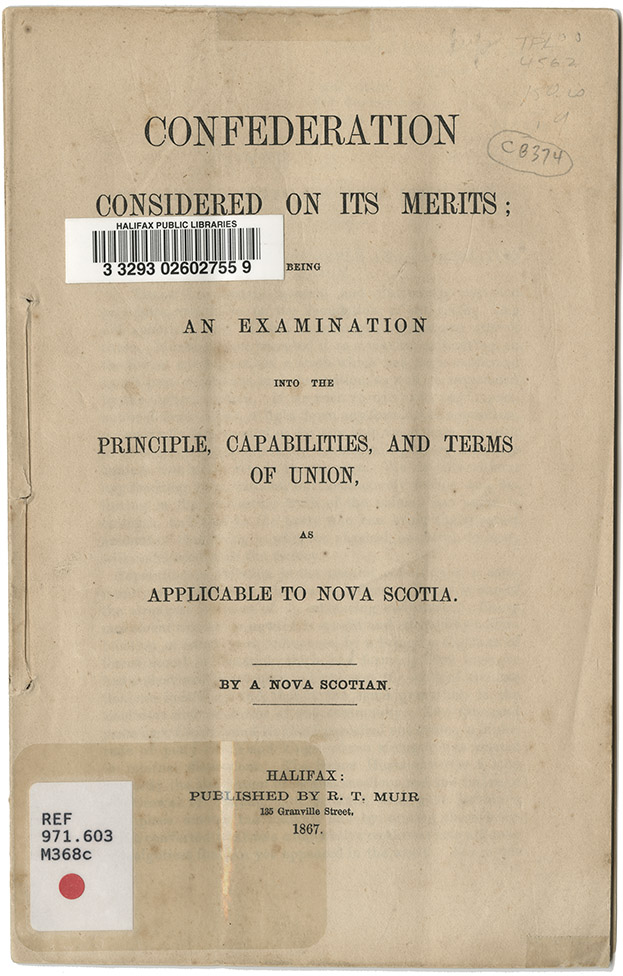Council of Nova Scotia Archives
Halifax Public Libraries
Who Wrote Confederation on its Merits: Being an Examination into the Principle, Capabilities and Terms of Union as Applicable to Nova Scotia?
33 pages previous page page 1 next page
Tucked away safely in the Closed Stacks of Halifax Central Library’s Local History collection, there is a small, thirty-six paged, hand-stitched unbound pamphlet that’s generated a bit of a Confederation conundrum. Published in 1867, and titled Confederation Considered on its Merits: Being an Examination into the Principle, Capabilities, and Terms of Union as Applicable to Nova Scotia by the anonymous “A Nova Scotian”, it has long been credited in the Halifax Public Libraries’ catalogue to being the work of John George Marshall (1786-1880), who at different times throughout his life was a Nova Scotia lawyer, legislator, judge, and published author. Marshall held a staunch Anti-Confederate position and was a keen supporter of Joseph Howe’s efforts to have the idea put before voters. So, why then, would he publish such a positive Pro-Confederation treaty? Did he have a change of heart, and published the booklet anonymously through the local Granville Street publisher R.T. Muir to protect his publicly known political position? Or, has this booklet been wrongly attributed to Marshall and the real author remains a mystery to this day?
According to The Dictionary of Canadian Biography, John George Marshall was born in Country Harbour, Nova Scotia in 1786, the son of Loyalist refugees. Throughout his life, he focused on social, religious and moral issues, was a zealous temperance advocate, and lectured on all of these topics across North American and Europe. Marshall was also a prolific writer and published many political pamphlets under his own name. A complete bibliography is found in the Macmillan Dictionary of Canadian Biography (1978). Interestingly, Macmillan indicates that Marshall wrote under the nom-de-plume “A Nova Scotian” for such titles as Remarks Upon the Proposed Federation of the Provinces (1864) and our own Confederation Considered on its Merits (1867). How Macmillan came to the conclusion that the nom-de-plume was in fact Marshall is unknown, but the two pamphlets are strikingly different from one another.
The 1864 Remarks pamphlet identified four possible outcomes of Confederation and then dissects each one from a very critical, Anti-Confederation standpoint. The tone and political position of this “A Nova Scotian” pamphlet is similar to a work that Marshall published under his own name a year later in 1865, entitled An Examination of the Proposed Union of the North American Provinces. Marshall makes a point of challenging several advocates for Confederation and cautions against rushing into any new political structure. There is a continuity of thought and Anti-Confederation sentiment in both pamphlets that Marshall and many other prominent Nova Scotians publicly declared at the time.
Given that Confederation Considered on its Merits (1867) takes a Pro-Confederation stance, it would be puzzling to find that John George Marshall changed his mind, and do so anonymously under his old nom-de-plume “A Nova Scotian”. So, if not written by Marshall, could the pamphlet be written by someone else as a form of political satire, emulating the earlier 1864 Remarks pamphlet to mock Marshall and the Anti-Confederates? A rebuttal soon followed the anonymous Confederation pamphlet, written by lawyer and politician Martin Isaac Wilkins (1804-1881), entitled Confederation Examined in the Light of Reason and Common Sense: and the British N.A. Act Shewn to be Unconstitutional (1867). Wilkins calls out the anonymous “A Nova Scotian” for not having the courage to sign his name to this “tissue of mere sophistries”. Anonymity was not considered proper political etiquette as the country drew near to Confederation.
To cast further doubt on the authorship of Confederation Considered on its Merits (1867), the Nova Scotia Archives have many letters written by John George Marshall to friends in the Nova Scotia political scene, as well as numerous letters he had written to local newspaper editorial pages. None refer to himself as the “A Nova Scotian” author or to the publication. In fact, many of his letters continue after 1867 to fiercely oppose Confederation (or the British North American Act), and he regularly took Joseph Howe to task for changing sides.
John George Marshall publicly expressed his concerns about taxation and a weakened political voice in the post-Confederation Nova Scotia world. His writings and letters create a picture of a citizen who stood by his principles and beliefs until his death in 1880. It is unlikely that he is the mysterious “A Nova Scotian” author. Which leaves us with a conundrum – should the Halifax Public Libraries catalogue record continue to attribute John George Marshall as the author of Confederation Considered on its Merits (1867)? At the very least, a question mark should be added to his name in the author field.
Date: 1867
Reference: Halifax Central Library Ref. 971.603 M368c
For more information, please contact the Local History Room at the Halifax Central Library.


